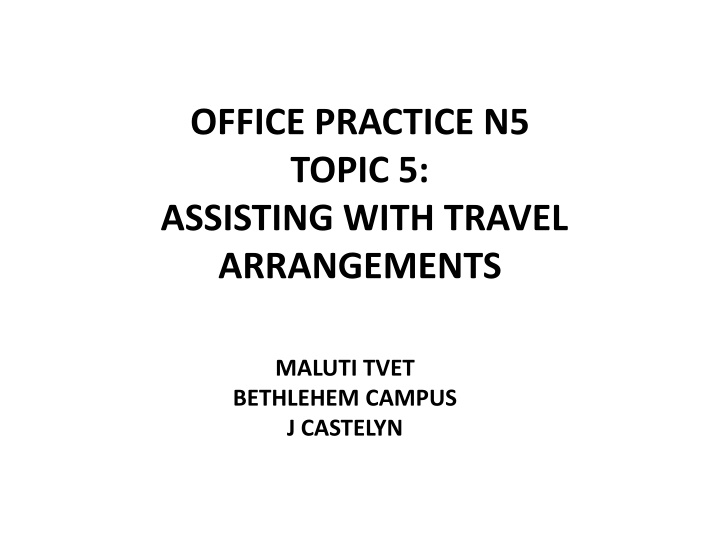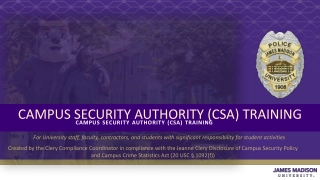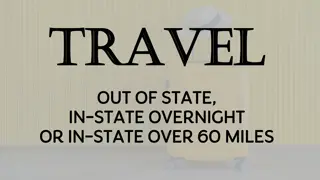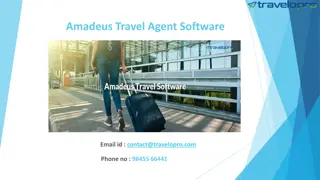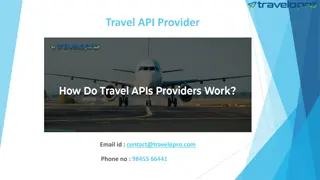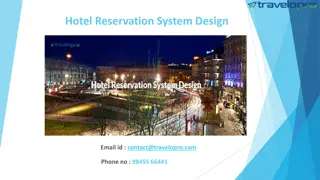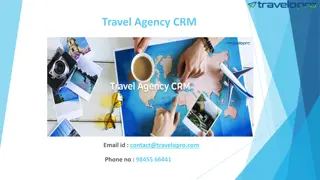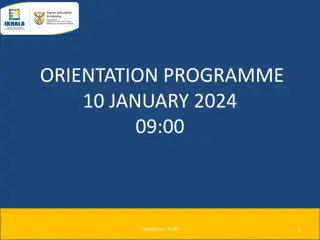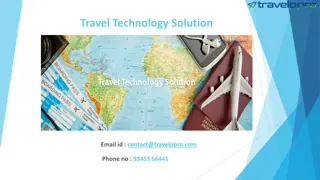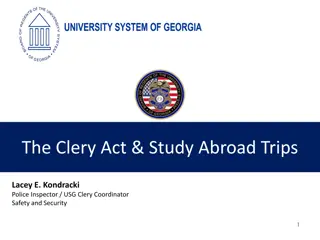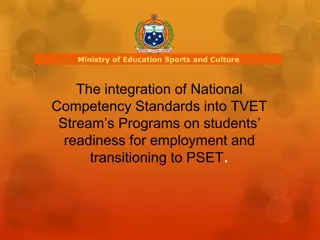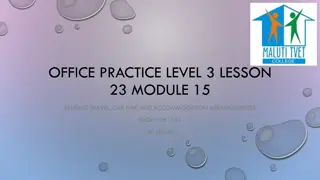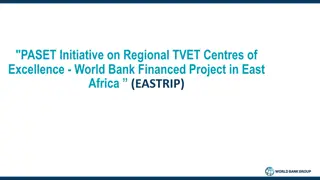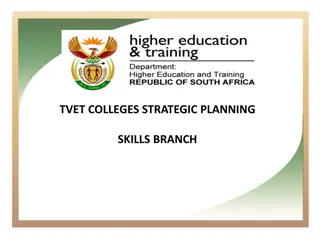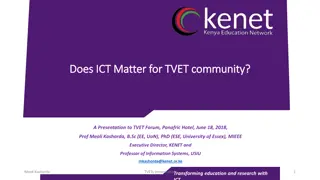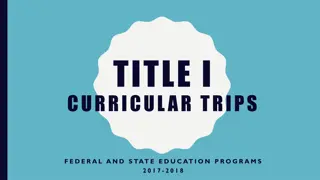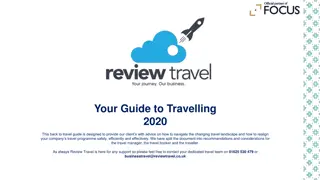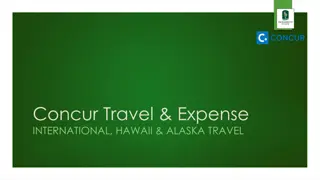Assisting with Travel Arrangements for Business Trips at Maluti TVET Bethlehem Campus
This topic covers additional duties related to business trips, including organizing travel information files, preparing itineraries, choosing travel modes and accommodations, making reservations, handling travel documents, and keeping the manager informed about arrangements. It also discusses preparing documents, providing meeting information, and managing office administration during the trip at Maluti TVET Bethlehem Campus.
Download Presentation

Please find below an Image/Link to download the presentation.
The content on the website is provided AS IS for your information and personal use only. It may not be sold, licensed, or shared on other websites without obtaining consent from the author.If you encounter any issues during the download, it is possible that the publisher has removed the file from their server.
You are allowed to download the files provided on this website for personal or commercial use, subject to the condition that they are used lawfully. All files are the property of their respective owners.
The content on the website is provided AS IS for your information and personal use only. It may not be sold, licensed, or shared on other websites without obtaining consent from the author.
E N D
Presentation Transcript
OFFICE PRACTICE N5 TOPIC 5: ASSISTING WITH TRAVEL ARRANGEMENTS MALUTI TVET BETHLEHEM CAMPUS J CASTELYN
TOPIC 5: ASSISTING WITH TRAVEL ARRANGEMENTS 3. ADDITIONAL DUTIES RELATED TO THE BUSINESS TRIP
3. ADDITIONAL DUTIES RELATED TO THE BUSINESS TRIP 3.1 3.1.1 Travel information file 3.1.2 Preparing the itinerary 3.1.3 Choice of mode of travel 3.1.4 Choice of accommodation 3.1.5 Travel and accommodation reservations/bookings 3.1.6 Travel documents and related arrangements 3.1.7 Informing the manager on the progress with arrangements Arrangements for the trip
3. ADDITIONAL DUTIES RELATED TO THE BUSINESS TRIP 3.2 3.2.1 Preparation of documents 3.2.2 Information for meetings 3.2.3 General information Arrangements for office administration 3.3 Arrangements with the manager regarding the office 3.3.1 Acting manager and interim procedures 3.3.2 Duties during the manager s absence
3.1.1 Information file: Start the planning process by opening a new travel information file for each trip. The file contain all the arrangements and research done before the trip in one place. The file must be arranged logically with suitable dividers between sections and clear headings and section indications to keep details organised Cover page: Write the name of the traveller, the destination and suggested departure and return dates and list of places to visit on the outside of the file. File an overall checklist of what to remember and what to arrange as the first page in the file or inside of the cover of the file. File all information and documents, in the file. Place tickets, vouchers, visas etc. visas, appointments, hotels, transportation, clients, events, tickets and connections to the inside of the cover. File the latest information at the top for easy access. Leave some lines open below each heading to allow for additional further details. Refer back to the checklist often to check that every item is given proper attention. Business trip planner: Ensure relevant information and planning regarding the trip is included in the file. Chronologically ordered business itinerary: compile the itinerary to include the date of departure and date of return. Final itinerary: Details of all appointments and all documents to be taken with must be in the file. Make a card for each day of the trip: Title of card is the date, listed below, the names of people, time, place and companies for the manager to keep with him to know when en where the next appointments are.
3.1.1 Information file: Checklist: Date of departure year/month/day Reservations, flight number, car train: List and communicate requests and details about flights, airlines, connections and process to the travel agent. Accommodation: Hotel bookings at point A, B, C etc. Research accommodation options, pricing and distance to clients. Documents that must accompany the traveller: Determine if a visa is required to travel to the destination country, health certificates, files, contracts etc. Money: Determine what the destination country s currency is and what the exchange rate is. Find out the average cost for hotels, meals and transportation. Find out how much cash you re allowed to take into the destination country and what the baggage allowance is. Research different modes of transport: Research airports, the areas they are in, names known by internationally, their abbreviations and services available at the airport e.g. Money changing, car rental, taxi services, distances from hotels and clients/airport taxes. Research about restaurants, tourists attractions and other points of interest worth visiting. Research which areas, places and attractions to avoid because of crime or recent violence. Research the destination country s business protocol, social habits, cultural practices, traditional wear, religion and politics and any other information to make the business trip successful and not offend anyone in the destination country. Cultural tips and observations: about acceptable social practices such as what people eat, how they eat, what to tip, how male and female rights differ, how families are run, what gift giving practices are as well what they consider taboo and what are invaluable to know before leaving on a business trip. Research about the weather and climate and include recommendations on how to dress and what to pack.
3.1.2 Preparing the itinerary: (Preliminary / Tentative) DEFINITION: A document with all the details of the planned trip: destinations, arrival and departure dates and times, accommodation and transport details
3.1.2 Preparing the itinerary: (Preliminary / Tentative/ Draft) The itinerary is an elaboration of the planning document. The itinerary contains detailed information about the date, the time and activity for each day at each time interval of time. Decide where to go, which cities and in what order. Decide how many places to visit in available time. A too full itinerary causes delays or unforeseen circumstances. Schedule in free openings to reschedule if necessary. Check for public holidays and major events in the countries you are visiting and consider different time zones. Check where manager would like to spend a weekend or preferring travelling in that area. Consult employer about places to be visited, number of appointments and confirm appointments. Confirm preferred mode of transport and type of accommodation. Make appointments well in advance for visas and vaccinations if required. When arranging meetings, contact the relevant manager on the other side to arrange a meeting. Type a rough draft and give to travel agent to make further arrangements. Finalise reservation only after the CEO has approved it. Draw up the final itinerary based on the planning list document. submit plan to CEO for approval and newer any questions and motivate your choices Be familiar with company policy on type of transport, accommodation, methods of payment, spending money and dietary.
Final itinerary: Once approved, the final itinerary can be typed. Reservations should already be finalised and all relevant information like flight nad hotel room numbers noted down. Confirm seat reservations and collect tickets from travel agents. Place all information and documents like tickets, vouchers, visas etc. in the file. Make appointments with customers or contact, arrange meetings, conferences, staff meetings with overseas staff, plan and finalise the budget details and re-examine the whole itinerary with the executive for problems. Type a final inventory of all the appointments that have been made and all the documents to be taken along. Each day s schedule can be typed on post-card sized cards that fits into an inside pocket. Place cards in chronological order. Copies of the itinerary and inventory must be made for other executives, the MA and for the executive s wife.
3.1.3 Choosing mode of travel: Domestic travel: Know the company policy regarding mode of transport before deciding which transport to make reservations on. Ensure authorisation. Expense forms have to be completed for claim forms to be submitted for petrol and hotel accommodation. Book rented cars well in advance. For travel and rest at the same time bus services are available. Know the location of major local airports and the distance from the city centres when booking domestic flights.
3.1.3 Choosing mode of travel: Overseas Travel: (abroad) Use familiar types of travel to use in the destination country. Modes of transport are car, bus, train, aeroplane Remember the purpose of the mode of travel . Choose the one that will get the manager the safest, fastest and most cost-effective way. Various airlines offer international flights from SA. Arrival at airports are made easy with a copy of the destination airport layout. Highlight on the map where to meet the ground transport arranged. When using a pre-booked hire car, ensure a GPS navigation system to navigate in the city. Various train networks are effective, fast, punctual, safe and eliminate problems of heavy traffic. Make up-to-date bookings on the internet.
3.1.4 Choosing accommodation Consider the company policy and budget of the company first and the preference of the manager. Accommodation should be close to the city, near the airport and the specific facilities are required. Specialised reference books and online information on different accommodation are available. Keep details of the accommodation where reservations have been made in the planning file like telephone/fax numbers, e-mail and physical address. Some businesses have standing arrangements with a specific hotel, guesthouse if regular business trips are arranged to that location.
3.1.5 Travel and accommodation reservations/bookings: To get the best deals for transportation and hotel accommodation, you must make reservations in advance of the planned trip. Reservations can be made online, by telephone, fax or any airline office. Tickets must be paid within a certain period or it will expire. If tickets are cancelled after it was paid for, only a % of the amount will be refunded. International hotel reservations can be made through a travel agent. Reservations can be verified on line or proof of reservations will be forwarded from the establishment. Confirmation documents must be shown on arrival at the establishment. When doing reservations yourself, contact the hotel directly. Make reservations on-line or telephonically and confirm afterwards in writing or via e-mail.
3.1.5 Using discount travel agent / consolidator when doing travel and accommodation reservations/bookings: Enquire about price and availability for an alternative airline. Trust the expertise of the assistant who will suggest cheaper dates and alternative routes. Try to negotiate. Sometimes the price is not fixed. Ask whether you can earn frequent flyer points with the airline. The reservations is valid for 24hours with no charge. If it is a discounted ticket, be aware and agree with restrictions and T s and C s. Ask the name of the airline, flight times and route. Repeat the details of the flight before ending the phone call like flight numbers, times, date, day of week, connections, cost , correct spelling of names. Ask for the name, telephone and extension number of the person you spoke to. As for a reference number / record locator. Plan ahead when booking airline tickets, cruise packages and hotel accommodations when planning a trip during the holiday seasons. When arranging meetings with clients at the same hotel, choose one suitable for that purpose.
3.1.6 Travel documents and related arrangements: 1. Passport: Internationally recognised travel document necessary for travel outside South Africa so that he can be allowed to travel outside SA. Verifies a person s identity and nationality. Be valid for the trip. Some countries endorse South African citizens entry into their country without needing a passport and a visa, but still needing a passport as it is a internationally recognised method of identification. Valid for 10 years. Can apply for a thicker maxi tourist passport for regular travelling. Has sufficient blank pages for endorsements. Apply for new passport well in advance. Temporary passport can be issued of a valid one is not available in time. Valid passport be shown before foreign currency or traveller s cheques are issued. Need to check with the embassy / consulate of the destination country in South Africa the rules and regulations and restrictions regarding passport validity and expire. Information first page: RSA at the top of page in English or France. Photo of passport holder. Full names and surname of passport holder. ID number Date of birth Passport number and barcode Passport issue and expiry dates Rest of pages numbered watermarked pages on which visas and entry and exit stamps will be issued for every trip out of and back into South Africa.
1. Pass port: Application: Stolen Passport: (what to do) Apply at Department of Home Affairs if not having a valid passport/ lost/damaged well in advance. A duly completed passport application form DHA-73. Original ID document/ birth certificate if under 16 and a copy. Present valid tourist passport. If passport are lost, present a loss of passport report and confirmation of loss reported at the police. Pay prescribed fee for the passport. A duly completed passport application form DHA-73. Original ID document/ birth certificate if under 16 and a copy. Present valid tourist passport. If passport are list, present a loss of passport report and confirmation of loss reported at the police. Pay prescribed fee for the passport. Apply at Department of Home Affairs When lost during travel, report immediately to the local police station. Copy of police report be taken to the nearest South African Embassy and apply for a temporary passport/emergency travel document.
3.1.6 Travel documents and related arrangements: 2. VISA Most countries of the world has a representative an embassy consulate in South Africa who issue visas to people who want to visit their countries. Official document giving permission to travel to, enter, or stay in a foreign country. Issued in a passport to allow travellers access to the destination country. Does not guarantee a traveller will be allowed into destination country. Not all countries require a visa for entry. South African passport holders enjoy visa exemptions for certain countries for a period of 14 365 days depending on the destination country namely (Lesotho, Jamaica, Sri Lanka, Ireland, Mozambique, Hong Kong, New Zeeland, Brazil, Argentina and Israel). Decision to grant entry lies with immigration officers of the destination country. Determine if a visa is needed for the country visiting. Check requirements before each trip. Passport is needed when applying for a visa. In most cases the applicant pay for a visa. Used for a limited period, usually for the duration of the visit to the country. Sometimes issued for multiple entries over a longer period. An agreement between a number of countries in Europe has resulted in travellers being able to use the same visa for entry into this group of countries a Schengen visa (namely Austria, Belgium, France, Germany, Greece, Italy, Luxembourg, the Netherlands, Portugal and Spain). Misuse of a visa like overstaying the allowed time or for other purposes other than a trip can result in your being charged, jailed, deported and black listed.
3.1.6 Travel documents and related arrangements: 3. INTERNATIONAL DRIVER S LICENCE Apply for IDP if travellers intend to drive abroad. Some countries do not recognise a south African driver s license, but only a IDP. The requirements for such a license is an official, legal driver s license and two passport photos. You don t need to write a test. Provides information about a driver in various languages, including English. Enables the manager to rent a car in a foreign country insurance Serves as an additional source of identification Issued by the Automobile Association ( AA) in SA or a travel agent. Are a legal document, issued for different countries and valid for one to three years. In many neighbouring countries the ordinary South African driver s licence is sufficient. Driving abroad: To drive abroad the manager needs his original driver s licence and his IDP with him. Certified copies be kept separated from originals South African driver s licences are recognised in SADC countries. A letter of verification to be obtained from the south African Department of Transport.
3.1.6 Travel documents and related arrangements: 4. HEALTH CERTIFICATES 3. INTERNATIONAL DRIVER S LICENCE Health certificates are a prerequisite for entry into some countries. Ask about health risks in a country to be visited in advance because there are sometimes prescribed time frames for immunisation e.g. Malaria, yellow fever etc. Proof of immunisation required for entering. In some countries immunisation is not compulsory but is advised. Arrange for a medical check 4 6 weeks prior the trip. Determine which country requires preventative medication and start drinking weeks in advance. Keep a record of the type and dates of inoculations of vaccinations your senior has had for future travelling. Travelling by road: Travelling to neighbouring countries, the original vehicle registration documents plus certified copies must always be taken along. Establish in advance where a temporary import permit for the vehicle can be obtained. The temporary important permit be valid for the full duration of the stay. Check with the manager s insurer that the vehicle will be covered in the destination country and be confirmed in writing. Check that the 3rdparty insurance is in order. Some countries require specific regulations and required stickers to take your vehicle across the border. Acquire at the AA of South Africa.
3.1.6 Travel documents and related arrangements: 4. HEALTH CERTIFICATES: Vaccines/ Yellow fever requirements: Yellow fever certificates are valid for 10 years as of 10 days after the date of vaccination. The manager need to comply with vaccination requirements and have this health certificate in place well in advance. The (WHO) divides vaccines for travel into three categories. ROUTINE: Must have had e.g. measles, rubella, mumps, diphtheria, tetanus, pertussis, polio RECOMENDED/OPTIONAL: Optional, but suggested for own good e.g. malaria pills, cholera, hepatitis A, Japanese encephalitis, meningococcal disease, rabies, tick flea, typhoid fever REQUIRED: Prerequisite for anyone that starts or pass the yellow fever belt of sub-Saharan Africa or tropical South America and enforced by the Department of Health e.g. yellow fever, meningococcal disease, polio
3.1.6 Travel documents and related arrangements: 5. TRAVEL INSURANCE CERTIFICATES: Take out insurance in case of any emergencies, illness, or theft. According to company policies representatives cannot travel without insurance to compensate for unforeseen circumstances e.g. lost of money, baggage, medical costs, flight cancellations, accidents or liability. Determine if flight tickets bought with credit cards include travel insurance, like with most banks. It is advisable to take out additional insurance for losses that are not covered by the free insurance or when the compensation for a loss will not be sufficient. Compensation for losses depend on the credit card used and accepted by the insurer. For example, the compensation paid out when a gold credit card was used for payment, is much higher than when an ordinary credit card was used for payment. This type of insurance is only valid for the duration of the trip and there are certain health conditions applicable to this type of insurance. The loss/theft of cash is usually not covered or when it is included it is usually limited to a small amount. Travel insurance can cover for medical expenses like hospitalisation and emergency evacuation. Medical treatments can be withheld if there is no proof of funds or travel insurance. Depending on the age, physical condition and destination, provision in the case of death should be considered. Travel agents and banks can advise on different options, packages and prices involved. Find out what is covered for international travelling.
3.1.6 Travel documents and related arrangements: 6. MONETARY ARRANGEMENTS: Exchanging ZAR for foreign currencies : Foreign exchange for travelling abroad can be bought from commercial banks and foreign exchange bureaus e.g. Letters of credit, travellers cheques, credit cards, notes and small change where the trip starts REASONS: Foreign currency control only allows a traveller to buy foreign currency within a certain period before the commencement of the journey. To buy foreign currency the air ticket must be submitted to the institution where the currency is bought. Most payments would have been made online via credit card or via internet by the time the flight and accommodation arrangements are confirmed. The manager would need cash for small payments in the right currency like telephone calls, customs, tips etc. Advise the manager on the limit that the destination country places on the amount of cash a traveller is allowed to bring into the country. Money can be exchanged at airports, but more expensive. For the rest of the trip the manager should pay with a personal or company credit card or travel wallet debit card The organisation usually pays for the expenses and gives the manager an allowance for other expenses. The allowance can be in the form of an advance or an allowance of a certain amount to be spent on a credit card. This covers expenses like meals, tips, toll gates, taxis etc. Once cash is needed the manager can use any ATM with a SASWITCH logo. Check with banks for the best rate of exchange before deciding which currency to take. The manager should keep record of all credit card payments and expenses so the company can reimburse him/her.
6. Monetary arrangements: Traveller cheques: Traveller cheques are useful where credit card facilities are not easy available. Travellers cheques can be cashed in the destination country at the airport, a bank, hotel or travel agent. Are used by travellers who do not carry a large amount of cash with them. Can be used locally and internationally. Issued by banks, Rennies and Thomas Cook. Each cheque is signed in the presence of the bank official who issues them. When the cheque are cashed the person will sign a second time in the presence of the person cashing them. The signatures must be the same otherwise the cheque will not be cashed. If these cheques are lost or stolen the bank will replace them. Advantage: Don t need to carry lots of cash. If they get lost the traveller haven't lost any money. Disadvantage: Once cashed, the traveller may walk around with a lot of cash on them. The exchange bureau charge the traveller to cash the cheques.
6. MONETARY ARRANGEMENTS: Travel card / travel wallet: Is a pre-paid MasterCard / Visa card that Absa, FNB, Nedbank and Standard Bank offer across a wide range of currencies such as the US dollar, Australian dollar. Euro and British pound. You load the card before you leave. Advantages: Rates at which currencies are bought are fixed. Convenient to swipe a card. Be used to draw cash from an ATM. Replaces the hassle of cashing in traveller s cheques. MasterCard are protected by chips and PINS. Visa cards are PIN-protected and have a signature panel at the back. Cards can be replaced if they get lost or stolen. A travel wallet allows you to budget for your holiday as it is prepaid. TIPS TO KEEP YOUR MONEY SAVE WHILE TRAVELLING: Keep cash or traveller cheques in several different places. Keep traveller cheques receipts separate from the cheques. Carry enough local currency to pay for a taxi from the airport, meals and the first night s hotel accommodation. Find a secure way to carry the funds and travel documents. Carry the bulk of your cash in a money belt around your waste.
3.1.6 Travel documents and related arrangements: 7. COPIES OF IMPORTANT DOCUMENTS: Make copies of important documents before manager leaves. Keep it stored in a safe place, separate from the valid passport. Put important documents and copies in the hotel room safe or in the locked luggage. For extra safety, leave extra copies at home or at office with somebody that can be contacted in an emergency.
3.1.7 Informing the manager on the progress with arrangements: Before arrangements can be finalised, they must be approved by the manager. When approved, regularly inform the manager of progress with arrangements. Draw up a progress report to indicate tasks completed, tasks in progress and tasks still to be completed. Consult with the manager throughout the preparations for the upcoming trip. Consult with travel agents regularly so that the most recent information can be filed in the travel information file. It is the manager s responsibility to communicate changes and updates on meetings, venues, dates and information or requests from clients to the secretary. It is the responsibility of the secretary to communicate updates from the travel agent to the manager. If there are options between flight times, types of accommodation and transport, the manager must be allowed to choose final arrangements that are in the best interest and to their liking. Remain open and honest, communicate clearly and ensure nobody is left in the dark about any part of the business trip. Be ready to answer any questions regarding the trip.
3.2 Arrangements for office administration 3.2.1 Preparation of documents/ speeches/information to take along: Prepare all other business documents and information for the rip like proposals, presentations, catalogues and business cards in advance and take them with you in hard copy, in soft copy or in an electronic file as well as saved externally on an additional disk or drive. Have business cards redesigned for the trip: Must project the image and status of the company and make enough to take with. Prepare all information and material that the manager is taking with: Brochures, power point presentations, USB memory sticks, CD/DVDs, sample products Type and proofread the executive s speeches and include all relevant documents in one file: If more than one speech, each speech on a different subject, put each presentation with it s enclosed documents in a separated file. Clearly mark each file on the outside with the relevant title or subject, time and place. Speeches need to prepared in advanced. The organising body requires a detailed speech, typed out in full months before the event. Have a back-up copy available. Sent to the correct contact person on time. Pack extra stationary, tapes, DVDs and other items required. Prepare the manager s laptop computer along with all the relevant equipment.
3.2 Arrangements for office administration 3.2.2 Information for meetings/ clients to be visited: Compile customer records for reference and background information. Draw up meeting profiles about the company or companies, its executives, key persons, expected problems and strengths. This is important background information the manager must have before going into a meeting with new contacts or partners. Research and draw up lists with names, addresses, telephone numbers, e- mail addresses, structure and history of the people or companies he/she will be meeting to make it easier to establish good grounds for sound business agreements. Include directions for getting there, maps and details of local transport systems. Contact friends or relatives living in the area the manager is visiting, so that they are aware of the visit. A break from official business might be welcome.
3.2 Arrangements for office administration 3.2.3 Provide general information: 1. Check-in at airport: Security inspections are done before allowing passengers to board. Ensure the manager arrives in time to manage check-in congestion. Do not exceed the container size limits of carry-on liquids, gels and aerosols otherwise his toiletries will be confiscated. Locks for luggage must be approved by the Travel Security Administration for luggage to open for inspection without having to cut the locks. 2. Registration of South Africans abroad: ROSA: Acronym for the Registration of South Africans Abroad. Assist the manager to register his trip with ROSA online service. Allows south Africans travelling or residing abroad to register online. The registered information of travellers allows the Department to assist South African citizens in an event of emergency. The Department assist South Africans becoming victims of crime, accidents, illness, death, natural/man-made disasters, civil unrest or whose family need to contact them in an emergency. The registration on ROSA is a free, voluntary service provided by Government.. ROSA is an initiative that is endorsed and supported by the Association of South African Travel Agents (ASATA)
3.2 Arrangements for office administration 3.2.3 Provide general information: 3. Best travel tips: Research as much possible about the sociological and logistical elements about your destination, people, customs, currency, weather, attire, transport, language and culture to provide the manager with valuable and helpful information to make the trip successful. Take sufficient travel insurance to cover hospital treatment, medical evacuation and even death. Register your trip on the ROSA on-line service prior leaving South Africa or whilst abroad. Double-check whether you require a visa or permit for the country or countries you are travelling through. Keep a copy of your passport information page, relevant visas, travel insurance, travellers cheques and credit card with you but not with the originals. Ensure you are familiar with the health risks of the country you intend visiting. Ensure your passport is valid for at least 6 months and has sufficient blank pages. Ensure your family know what your movements will be while away. Remember to leave and enter South Africa on your South African passport, if you have dual nationality. Always act within the limits of the law.
3.3 Arrangements with the manager regarding the office 3.3.1 Acting manager and interim procedures: Do not assume that you are your manager s representative in his or her absence. It is required that employees may never be left unsupervised An acting manager will stand in for the time your manager is away. You will still have to meet deadlines and complete your duties, task and responsibilities. Interim procedures could be based on the manager s instructions to the acting manager, the acting manager s own decisions and management style or what is dictated in the company business policy. Discuss problems with the acting manager. You must distinguish which matters must be referred to the acting manager and which must be put aside for your manager to deal with when he returns. Allow some time in your schedule to consult with the acting manager and offer to perform duties you are familiar with and normally would do for your manager.
3.3 Arrangements with the manager regarding the office 3.3.2 Duties during the manager s absence: You are not on holiday while your manager is away. Complete all tasks and duties that were put aside while you were preparing for the trip. Do not neglect any tasks or responsibilities during this time because you need to keep the office functional and productive in the absence of your manager. Focus and keep up with everyday administrative duties such as responding to e- mails, answering calls, handling queries, replying to and sending out business correspondence etc. If instructed to do so, the MA should represent the manager in attending meetings, taking minutes or sit in on a client briefing in the manager s absence to update the manager on his return. You need to support your manager during the time of his trip. Always have information he needs or help out with a crises. If things changes or go wrong the travel agent need to help him with alternative arrangements, contact numbers or advice to resolve the matter. Stay at your desk, working at the same pace you would have. If assisting more than one manager, schedule in as much time possible to work for the other mangers in the office. Open incoming mail as soon as possible. Allow additional time on your schedule to take care of the incoming mail.
3.3 Arrangements with the manager regarding the office 3.3.2 Duties during the manager s absence: Keep photocopies on your desk of documents of completed tasks to bring your manager up to date when the returns. Open a file with details of all tasks to be dealt with when the manager returns telephone, fax, e-mail messages. Schedule appointments for the manager in the same way as if he is in the office. Arrange only a few appointments for the first few days the manager will be in the office. Plan your schedule for free time on the first day on the manger s return to follow-up on work generated by the recent trip. To get most out of the trip, the manager should follow-up immediately. The overall objective is to maintain and develop contact with those met that offer the best prospects for an on- going business relationship.
3.3 Arrangements with the manager regarding the office 3.3.2 Duties during the manager s absence: Follow-up tasks for the manager to address upon return: Send letters of thanks to those who took the time to meet with him. You must raise any additional issues that you feel are relevant. Comply with any requests for additional information from parties the manager met with on the trip. Prepare market reports or any other studies that may be required as a result of the trip. Review action items arising from the trip and set up a process for implementation. Take special care to leave the manager s diary open for at least two days after his return. Update the manager on the developments and events that took place during his absence and to finalise the trip with the necessary feedback reports, to catch up on work and to get up to speed with what happened during the absence.
